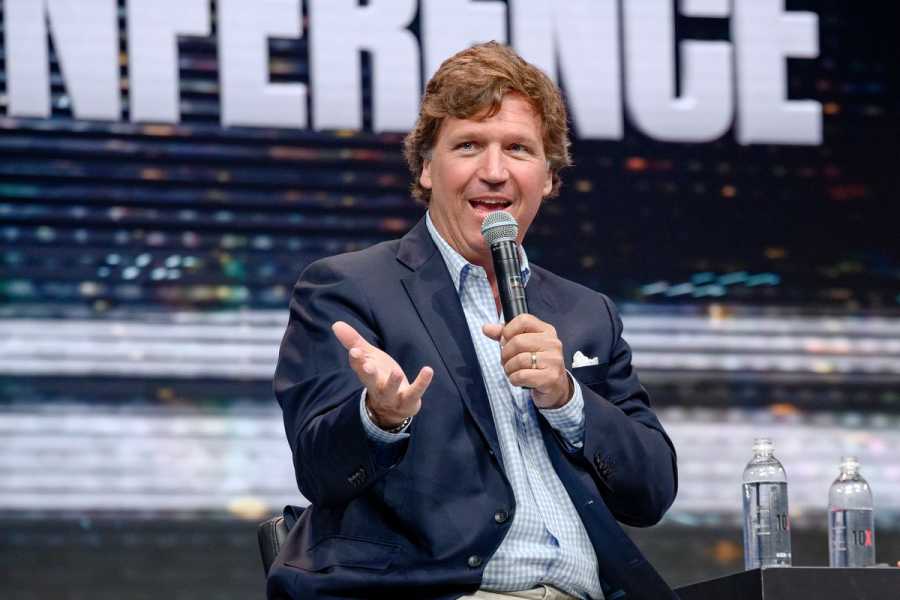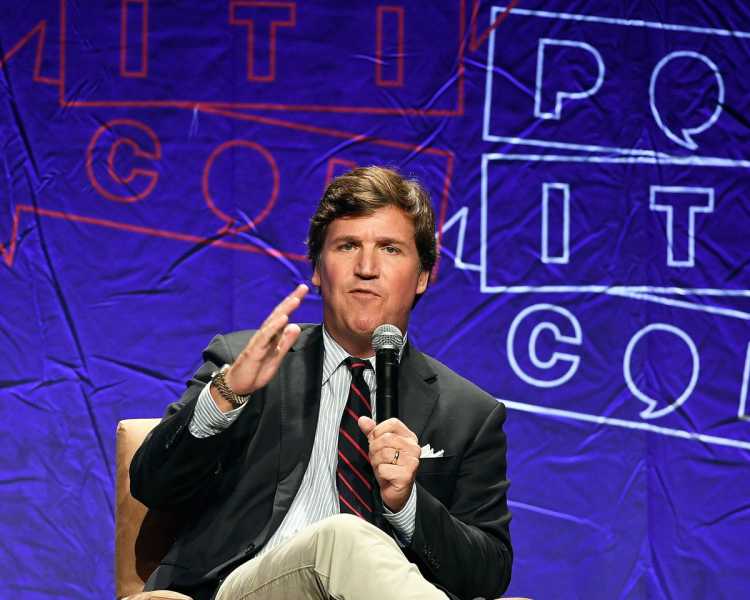Carlson mainstreamed antisemitism for a long time, and conservatives seemed not to care. Then he set his sights on Israel.

Tucker Carlson speaks in Florida on April 2, 2024. Ivan Apfel/Getty Images Zack Beauchamp is a senior correspondent at Vox, where he covers ideology and challenges to democracy, both at home and abroad. Before coming to Vox in 2014, he edited TP Ideas, a section of Think Progress devoted to the ideas shaping our political world.
The New York Times once described Tucker Carlson’s Fox News hour as “the most racist show in the history of cable news.” In the past week, allegations of bigotry involving his new show on X have come from a rather different corner: his fellow conservatives.
The fight started April 9, when Carlson published a friendly interview with Palestinian pastor Munther Isaac. The pastor — who has reportedly praised the “strength” of the October 7 attackers — argued that Israel is no friend to Christians: It bombs them in Gaza, represses them in the West Bank, and restricts their ability to proselytize inside Israel proper. The interview went viral, receiving over 30,000 reposts so far.
Erick Erickson, a prominent radio host and former Carlson ally, spoke for many on the right when he labeled Tucker a “pro-Hamas” ally of “the antisemites on college campuses, and the terrorist-supporting progressives of the American left.” Carlson has, according to Erickson, become “willing to use his platform and formerly earned trust and reputation to persuade the easily manipulated to believe the lies he used to rail against.”
Rep. Dan Crenshaw (R-TX) wrote a blistering post on X that attempted to banish Carlson from the conservative movement entirely.
“Tucker’s MO is simple: defend America’s enemies and attack America’s allies. There isn’t an objective bone left in that washed up news host’s body,” Crenshaw wrote. “Tucker will eventually fade into nothingness, because his veneer of faux intellectualism is quickly falling apart and revealing who he truly is: a cowardly, know-nothing elitist who is full of shit.”
While Erickson and Crenshaw are seen as more establishment-friendly voices nowadays, the outrage at Carlson was shared even by some in the right’s Trumpier corners: Even the sorts of people who oppose Ukraine aid laid into the former Fox host after the Isaac interview. Only an openly antisemitic fringe of the conservative movement — the so-called Groypers — seem to be gleeful, believing that pitting Israel against Christians can bring old-school European Jew hatred to contemporary America.
“It’s waking people up. It’s making people aware of the fundamentals — which is first and foremost that Jews are not Christians,” said Nick Fuentes, the leading voice of the Groypers. “Once you get into those basics, you can start to build upon that and get to where we are.”
So is what Carlson suggests about Israel and Christians accurate? And what does the right-wing backlash against him say about the state of the conservative movement today?
Broadly, I think there are basically three key answers to these questions:
Let’s discuss each of these points in turn.
Israel doesn’t persecute Christians, but it does oppress Palestinians
Christians are a small minority inside Israel — about 2 percent of the total population. But this mostly Arab group’s numbers are growing, and they tend to do better than their Muslim peers in socioeconomic terms. A 2021 report from Israel’s Central Bureau of Statistics found that Israeli Christians were more likely to get a college degree and less likely to be on welfare attainment than Muslims and even Jews.
Israeli law guarantees formal freedom of religion, and there are no legal restrictions on Christian worship. There is some restriction on missionary activity, but that typically only affects travel visas for foreigners rather than Christians living in Israel. No one in the country has been prosecuted for missionary activity.
That’s not to say Israeli Christians have no problems.
Jewish extremists occasionally harass Christians in Jerusalem, and there are tensions surrounding the city’s holy sites. Danny Seidemann, a leading expert on Jerusalem, has warned that settler plans for the city threaten the historic Christian presence there. But this, per Seidemann, is less a reflection of hostility toward Christians per se than it is a reflection of the generalized settler goal to control all the land between the Jordan River and the Mediterranean Sea.

Latin Patriarch of Jerusalem Pierbattista Pizzaballa blesses Christian worshipers at the Church of the Holy Sepulchre in Jerusalem on Easter Sunday 2024. Ahmad Gharabli/AFP/Getty Images
But while the Israeli state does not officially discriminate against Israeli Christians, it does oppress Palestinians — and Palestinian Christians suffer along with their Muslim brethren. From churches bombed in Gaza to Israel’s “security barrier” cutting right through Bethlehem, Palestinian Christians experience Israeli occupation the same way that other Palestinians do: as violence and unfreedom.
“The major threat to Christian communities and institutions is dismissiveness. They’re not seen,” Seidemann writes. “What’s seen are Palestinians and Arabs who are always suspected terrorists.”
Most of Isaac’s comments in the Carlson interview were focused on explaining how the general cruelty of the occupation hurts Palestinian Christians. But Carlson’s additions — such as saying Israel is “blowing up churches and killing Christians” — go a bit further. He suggests that Israel is targeting Christians as a class, and that the Jewish state is fundamentally hostile to Christianity.
In doing so, he is playing with antisemitic fire: invoking the longstanding canard that Jews are a danger to the Christian West.
“Palestinian Christians, like all Palestinians, suffer under occupation,” writes Matt Duss, a leading Christian expert on the Israel-Palestine conflict. But “Tucker Carlson is absolutely not an ally in the struggle for safety and equality. Be clear: he seeks division here, not solidarity.”
The right’s turn on Tucker is hypocritical — at best
The conservative movement is highly factional, riven by deep disagreements over all sorts of major issues. But with the exception of the openly antisemitic fringe — which we’ll talk about in a second — most of them have expressed anger at Carlson’s interview. But what’s striking in this discourse is a pervasive sentiment that Carlson’s current output is radically at odds with his work for Fox.
Jenna Ellis, former Trump 2020 election attorney and convicted felon, said on her Salem News Channel show that Tucker’s worldview is “very, very different than who he presented himself as on Fox News.” Her guest, Newsweek opinion editor Josh Hammer, who is Jewish, agreed.
“I genuinely enjoyed watching Tucker on Fox. But it turns out Tucker needed Fox more than Fox needed Tucker, because he needed those guardrails. He needed his staffers [and] research assistants,” Hammer said.
The specifics of Hammer’s claim are pretty funny, as Carlson’s staff at Fox included notorious extremists. In 2020, head writer Blake Neff resigned after his history of racist posts in anonymous forums came to light.
More generally, the Fox show was typically far worse than anything in the Isaac interview.
From openly espousing the “great replacement” conspiracy theory to suggesting that immigrants to the United States are dirty and diseased to peddling the same sort of antisemitic lies that motivated the 2018 Tree of Life synagogue shooting, Carlson consistently worked to make some of the most dangerous fringe ideas in American politics palatable to mainstream Republicans. This flirtation with antisemitism isn’t a break from Carlson’s longstanding persona but an extension of it.

Tucker Carlson in 2018, while he was still hosting on Fox. Michael S. Schwartz/Getty Images
The internal conservative discourse on Carlson is thus both substantively and psychologically revealing.
Substantively, it shows that the right is willing to forgive or downplay antisemitism unless it’s somehow linked to criticism of Israel — in which case there’s a zero-tolerance policy. Psychologically, it shows there is a powerful need to reconcile conservatives’ previous love of Carlson with the reality of who he is, requiring implausible contortions about his changing radically after leaving Fox.
“Tucker Carlson is the same person he was for his last few years at Fox. You may have pretended not to see it because it would have been personally inconvenient, but there were a select few of us on the Right who stated the uncomfortable truth out loud and were scorned for it,” Mediaite’s Isaac Schorr writes.
The reticence among conservatives to acknowledge that Schorr was right all along points to something bigger: that the issue of right-wing antisemitism is much more serious than mainstream conservatives want to admit.
The right’s growing antisemitism problem
In the past few years, the Groypers have looked more influential than many on the more mainstream right seem to appreciate. In 2022, Nick Fuentes finagled an invite to Mar-a-Lago and had dinner with Donald Trump. More recently, popular podcaster Candace Owens has outed herself as a Groyper-adjacent antisemite. While this turn led to her departure from the right-wing Daily Wire, it also showed how much the movement has made inroads on the broader right.
During the Owens saga, Daily Wire CEO Jeremy Boreing sat down for a conversation with Fuentes that was streamed on X. Speaking to a man he had once called “a wicked little s**t with evil ideas,″ Boreing praised Fuentes as a “most talented” and “very funny” broadcaster — and invited him to be a guest on a Daily Wire show.

Woven Stars of David at the Tree of Life Synagogue on the 1st Anniversary of the shooting on October 27, 2019. Jeff Swensen/Getty Images
There’s a lot of evidence that right-wing antisemitism is rising.
While much attention has been paid (rightly) to left-wing antisemitism after October 7, academic research suggests that antisemitic attitudes are disproportionately concentrated among right-wing young adults. Right-wing extremists are responsible for nearly all of the deadly attacks on Jews and Jewish institutions in recent years. Trump’s own rhetoric has long been rife with antisemitic stereotypes and conspiracy theories.
The simple fact is that the worldview of the antisemitic right has clear resonance with the Trumpified Republican party. Their influence is primarily felt online today, but what happens online doesn’t always stay there. There’s enough evidence of this bleeding out into the real world — all-too-often literally — that it’s worth being alarmed about it.
The reaction to Carlson’s interview raises a question about whether conservatives can see this. Are they merely angry that Tucker’s longtime antisemitism turned into anti-Israel sentiment? Or are they capable of the broader self-reflection and self-policing necessary to fix the movement’s deeper problem with Jews?
Sourse: vox.com